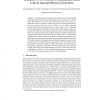Free Online Productivity Tools
i2Speak
i2Symbol
i2OCR
iTex2Img
iWeb2Print
iWeb2Shot
i2Type
iPdf2Split
iPdf2Merge
i2Bopomofo
i2Arabic
i2Style
i2Image
i2PDF
iLatex2Rtf
Sci2ools
123
Voted
ESORICS
2011
Springer
2011
Springer
To Release or Not to Release: Evaluating Information Leaks in Aggregate Human-Genome Data
The rapid progress of human genome studies leads to a strong demand of aggregate human DNA data (e.g, allele frequencies, test statistics, etc.), whose public dissemination, however, has been impeded by privacy concerns. Prior research shows that it is possible to identify the presence of some participants in a study from such data, and in some cases, even fully recover their DNA sequences. A critical issue, therefore, becomes how to evaluate such a risk on individual data-sets and determine when they are safe to release. In this paper, we report our research that makes the first attempt to address this issue. We first identified the space of the aggregate-data-release problem, through examining common types of aggregate data and the typical threats they are facing. Then, we performed an in-depth study on different scenarios of attacks on different types of data, which sheds light on several fundamental questions in this problem domain. Particularly, we found that attacks on aggrega...
| Added | 20 Dec 2011 |
| Updated | 20 Dec 2011 |
| Type | Journal |
| Year | 2011 |
| Where | ESORICS |
| Authors | Xiao-yong Zhou, Bo Peng, Yong Fuga Li, Yangyi Chen, Haixu Tang, XiaoFeng Wang |
Comments (0)

